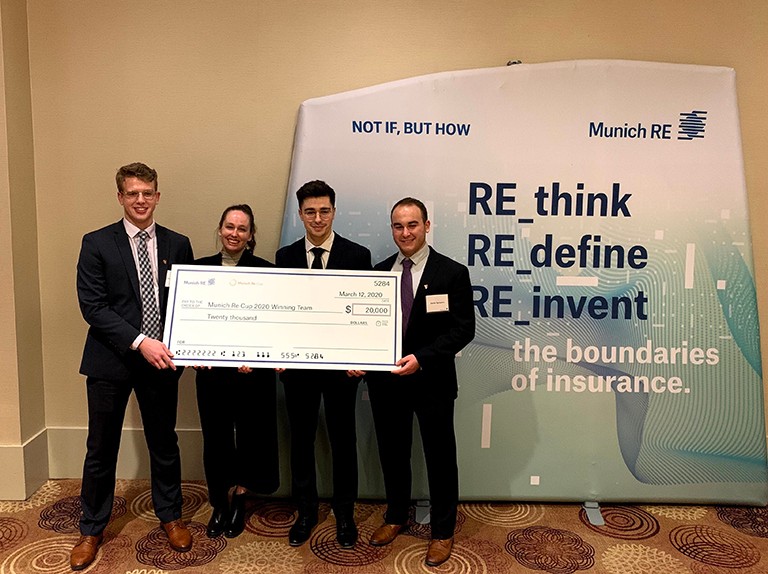 The Concordia actuarial mathematics team that won the prestigious Munich Re Cup in 2020: Jacob Blair, Catherine Dagenais-Roberge, Ioannis Volakakis and Daniel Sylvestre.
The Concordia actuarial mathematics team that won the prestigious Munich Re Cup in 2020: Jacob Blair, Catherine Dagenais-Roberge, Ioannis Volakakis and Daniel Sylvestre.Ada Lovelace Day - named after the 19th-century English mathematician and computer science pioneer - is celebrated annually on the second Tuesday of October.
The international event, which falls on October 13 this year, aims to recognize and promote inspiring women in STEM (science, technology, engineering and mathematics).
Catherine Dagenais-Roberge, a third-year student in Concordia's Department of Mathematics and Statistics in the Faculty of Arts and Science, is one such woman.
She was part of the Concordia team that recently won the prestigious Munich Re Cup, which rewards projects that apply real-world solutions to business problems using analytical, technical and problem-solving skills. The team took home a $20,000 prize.
Dagenais-Roberge describes her experience at the competition and offers encouragement to other young women in STEM fields.
'If we take that chance and try, we will succeed and grow'
Why is the Munich Re Cup so significant?
Catherine Dagenais-Roberge: The Munich Re Cup is the premier actuarial case competition in North America. Teams of three to four students from universities across Canada and the United States are encouraged to apply. In 2020, students applied individually and were paired into teams. The Concordia crew that was selected consisted of three third-year students: Daniel Sylvestre, Jacob Blair and Ioannis Volakakis and me, a second-year student at the time.
This case competition is significant because it allows students to work on a project from start to finish, which can take months. You get the opportunity to really showcase your skills and innovative ideas and to present in front of professionals.
Tell us about your project.
C D-R: This year, the case competition addressed the current issue of mortality improvement in the general U.S. population, which is slowing down. The case therefore gave us data on an artificial life insurance company and asked for a business plan or solution to update their mortality improvement scale.
We came up with several important causes for this downturn, but we isolated the opioid crisis as the main cause for such an important slowdown. We analyzed the differences between our insurance population and the general population and isolated education as the central one.
Using the scale we created, we presented the consequences of a new scale on the business portfolio and profitability, and we suggested several business strategies to manage risk and adapt to an evolving industry. These included diversification, hedging, risk-sharing and accelerated underwriting.
What led you to Concordia, and why did you choose the Department of Mathematics and Statistics?
C D-R: I completed a double DEC at Montreal's Vanier College in science and commerce because I was interested in both scientific research and finance.
During my time there, some students from Concordia came to Vanier to give a conference on actuarial mathematics. It was the first time I had heard about a career in mathematics that was not teaching or accounting, and I was immediately interested.
After graduating from Vanier College, I took a gap year and travelled to Australia. I was deciding between actuarial mathematics and marine biology. I finally chose to study the former, which has definitely been the right choice for me up to date. I applied to Concordia because I still had such a good memory of the conference given when I was at Vanier.
What is your message to young women pursuing a career in STEM, and especially in mathematics and statistics?
C D-R: I would like to tell them to support and encourage one another, and do not be afraid to offer or ask for help. I think that for women in STEM, it is very important to project confidence and not to be afraid to dive into a challenging, uncomfortable situation.
Speak up in that meeting, share your innovative ideas and apply for that "reach" opportunity. Network with senior professors, researchers or professionals. Keep being resourceful and curious because that is how you will grow and progress in your career and as a person.
During my first year at Concordia, I attended a networking event after only one week on campus. For me, it was a stressful situation since I was new to the actuarial world and I still didn't know all that much about it. But I was determined to rise to the challenge and do my best.
I spoke with a recruiter from an insurance company and we hit it off. She recommended I apply for a summer internship with them. When I tried to apply, I realized that their application didn't allow first-year university students since they were looking for interns with more experience.
Based on our interaction, I decided to take a chance and send my application via the comments section of their website. A few days afterwards, I got a call for an interview because my resume had made it to the recruiter's desk. And I ended up getting that internship.
That is what I mean by taking that dive into the challenge. Oftentimes we assume that we don't have the experience or the guts for an opportunity, but if we take that chance and try, we will succeed and grow. So, take that opportunity and encourage other women to do the same. That's how we will all grow as a community.
Learn more about Concordia's Department of Mathematics and Statistics.






